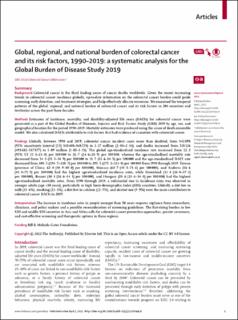Global, regional, and national burden of colorectal cancer and its risk factors, 1990–2019: a systematic analysis for the Global Burden of Disease Study 2019
Sharma, Rajesh; Abbasi-Kangevari, Mohsen; Kisa, Adnan; Vos, Theo; Naghavi, Mohsen; Kisa, Sezer; Colorectal Cancer Collaborator, GBD 2019
Peer reviewed, Journal article
Published version
Permanent lenke
https://hdl.handle.net/11250/3012865Utgivelsesdato
2022-06-13Metadata
Vis full innførselSamlinger
Originalversjon
The Lancet Gastroenterology and Hepatology. 2022, . https://doi.org/10.1016/S2468-1253(22)00044-9Sammendrag
Background: Colorectal cancer is the third leading cause of cancer deaths worldwide. Given the recent increasing trends in colorectal cancer incidence globally, up-to-date information on the colorectal cancer burden could guide screening, early detection, and treatment strategies, and help effectively allocate resources. We examined the temporal patterns of the global, regional, and national burden of colorectal cancer and its risk factors in 204 countries and territories across the past three decades.
Methods: Estimates of incidence, mortality, and disability-adjusted life years (DALYs) for colorectal cancer were generated as a part of the Global Burden of Diseases, Injuries and Risk Factors Study (GBD) 2019 by age, sex, and geographical location for the period 1990–2019. Mortality estimates were produced using the cause of death ensemble model. We also calculated DALYs attributable to risk factors that had evidence of causation with colorectal cancer.
Findings: Globally, between 1990 and 2019, colorectal cancer incident cases more than doubled, from 842 098 (95% uncertainty interval [UI] 810 408–868574) to 2·17 million (2·00–2·34), and deaths increased from 518 126 (493 682–537 877) to 1·09 million (1·02–1·15). The global age-standardised incidence rate increased from 22·2 (95% UI 21·3–23·0) per 100000 to 26·7 (24·6–28·9) per 100000, whereas the age-standardised mortality rate decreased from 14·3 (13·5–14·9) per 100 000 to 13·7 (12·6–14·5) per 100 000 and the age-standardised DALY rate decreased from 308·5 (294·7–320·7) per 100000 to 295·5 (275·2–313·0) per 100000 from 1990 through 2019. Taiwan (province of China; 62·0 [48·9–80·0] per 100000), Monaco (60·7 [48·5–73·6] per 100000), and Andorra (56·6 [42·8–71·9] per 100 000) had the highest age-standardised incidence rates, while Greenland (31·4 [26·0–37·1] per 100 000), Brunei (30·3 [26·6–34·1] per 100 000), and Hungary (28·6 [23·6–34·0] per 100000) had the highest age-standardised mortality rates. From 1990 through 2019, a substantial rise in incidence rates was observed in younger adults (age <50 years), particularly in high Socio-demographic Index (SDI) countries. Globally, a diet low in milk (15·6%), smoking (13·3%), a diet low in calcium (12·9%), and alcohol use (9·9%) were the main contributors to colorectal cancer DALYs in 2019.
Interpretation: The increase in incidence rates in people younger than 50 years requires vigilance from researchers, clinicians, and policy makers and a possible reconsideration of screening guidelines. The fast-rising burden in low SDI and middle SDI countries in Asia and Africa calls for colorectal cancer prevention approaches, greater awareness, and cost-effective screening and therapeutic options in these regions.
Utgiver
ElsevierSerie
The Lancet Gastroenterology and Hepatology;Volume 7, Issue 7Tidsskrift
The Lancet Gastroenterology and HepatologyOpphavsrett
© 2022 The Author(s)Beslektede innførsler
Viser innførsler beslektet ved tittel, forfatter og emneord.
-
“A limited focus on cancer rehabilitation”—A qualitative study of the experiences from Norwegian Cancer Coordinators in Primary Health Care
Lie, Nataskja-Elena Kersting; Koren Solvang, Per; Hauken, May (European Journal of Cancer Care; Volume 28, Issue 4. Special Issue: Themed section on Re‐imagining Psycho‐Oncology. July 2019 e13030., Journal article; Peer reviewed, 2019-01-17)Objective: The facilitation of complex cancer rehabilitation interventions in primary health care has become of growing importance to meet the bio-psycho-social needs of cancer survivors. However, the delivery of cancer ... -
Somatic EP300-G211S mutations are associated with overall somatic mutational patterns and breast cancer specific survival in triple-negative breast cancer
Bemanian, Vahid; Noone, John Cristopher; Sauer, Torill; Touma, Joel Joul; Vetvik, Katja K.; Söderberg-Naucler, Cecilia; Lindstrøm, Jonas Christoffer; Bukholm, Ida Rashida Khan; Kristensen, Vessela N.; Geisler, Jürgen (Breast cancer research and treatment;172(2), Journal article; Peer reviewed, 2018-08-21)Purpose We have compared the mutational profiles of human breast cancer tumor samples belonging to all major subgroups with special emphasis on triple-negative breast cancer (TNBC). Our major goal was to identify specific ... -
The role of cancer coordinators in improving collaboration in cancer care at local levels following the coordination reform
Moshina, Nataliia (Master thesis, 2014)The present study is devoted to one area of change in the Norwegian cancer care associated with the Coordination Reform implemented in 2012. More specifically, my aim has been to shed light on the role cancer coordinators ...

